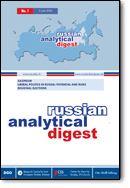Nr. 125: Russias Relations With Turkey, Bulgaria and Romania

Autor(en): Sener Aktürk, Natalia Ulchenko, Kyril Drezov, Simona R. Soare
Herausgeber: Stephen Aris, Matthias Neumann, Robert Orttung, Jeronim Perovic, Heiko Pleines, Hans-Henning Schröder, Aglaya Snetkov
Serie: Russian Analytical Digest (RAD)
Ausgabe: 125
Verlag(e): Center for Security Studies (CSS), ETH Zurich; Research Centre for East European Studies, University of Bremen; Institute for European, Russian and Eurasian Studies, George Washington University
Publikationsjahr: 2013
